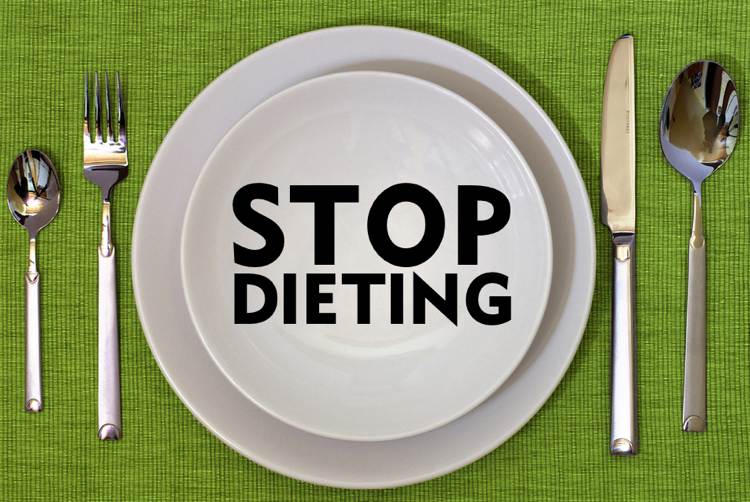I was checking out at the grocery store the other day. I turned around and noticed that the man behind me was eating a cookie. He offered me some and sheepishly explained: “I know. I’m going off my diet.”
Whaaaat?
Now, let me get one thing clear. I do not care what you eat. Not. One. Bit. (In fact, I’m quite certain that if we ALL cared less about what other people were eating we *might* actually have a better understanding of OUR own hungers but I digress…) Furthermore, I operate under the believe that there actually is no ‘bad’ food. There is just food. That’s it.
Now, before I get comments from my ‘real’ food advocate friends I will allow one caveat: There is food that feels good when we eat it, and, there is food that our body contests sometimes. We should learn to eat more of the former because it feels better. Then, we can learn to minimize the foods that make us feel yucky. (HINT: Don’t eat twinkies.) We need to remember to not ask ourselves to be ‘perfect’ with this, because perfect is miserable and lonely. Instead, we need to be kind and remember that our physical relationship with different foods changes over time. Simply, we need to pay attention.
Paying Attention Is Not A Diet. It’s A Lifestyle
Can you ditch the diet in favor of your own beautiful intuition? What would that feel like for you?! If you are not convinced (or maybe just scared) here are a few more reasons to ENJOY that cookie and drop the diet!
1) Dieting Is Disconnecting
Diets by definition are restricting. (Diet (v): restrict oneself to small amounts or special kinds of food in order to lose weight.) The more restriction and regimentation we put on our bodies the more we mute our own experience. This affects us both physically and socially. Think about it: Have you ever ‘forced’ yourself to follow an arbitrary diet? Did your dieting behavior interrupt your social life? Did you find yourself denying bodily urges simply because a book told you that you should “avoid” certain foods? Disconnecting from our basic needs (and, yes, this includes friend time!) in order to adhere to a certain ‘rules’ doesn’t make us healthier. Disconnecting makes us numb.
2) Dieting Makes You An Asshole
Dieting changes your brain. (And, for what it’s worth mindless eating affects your brain as well; this is why your attention matters!) Because food is nature’s medicine, every time we change and restrict how we eat we change our brain chemistry and hormone balance. This has immediate and long-lasting effects in mood and affect. Simply, your brain is hardwired to protect you; when you drastically cut nutrients your brain will send signals to counter your behavior and get you fed!
Further, long-term deprivation can alter your neural pathways and your capacity to be present. In one famous study, a group of healthy men we put on extreme diets so that the military could learn more about food rationing. Men were put on a 24-week “starvation” diet (of 1,600 calories). Below are some interesting findings:
Physically, the men reported incessant hunger, weakness, exhaustion and they lost 21% of their strength in the first 12 weeks alone. They experienced dizziness, muscle wasting, hair loss and reduced coordination. Several withdrew from their university classes, because they simply didn’t have the energy or motivation to attend.
Psychologically, the men became obsessed with food, meal times and everything to do with eating (a number became chefs after the experiment; such was their interest in food). They had to ‘buddy up’ to avoid breaking their diets, as their drive to binge was so enormous. Before the buddy system was put in place, a couple did get hold of some forbidden food and binge and suffered extreme guilt and self-loathing as a result. (It is fair to assume, therefore, that, had this not been a confined experiment, all men would have given up on their ‘diet’). The men reported extreme depression, irritability, a sense of deprivation and they lost all interest in sex. (They actually lost all interest in anything other than food – such is the human drive to overcome hunger).
It can be no surprise; therefore, that when given free access to food, in the final two months [!of!], the men overate and binged to correct the calorie deficit they had suffered. One man managed to eat 11,500 calories in one day and men still felt hungry consuming twice the number of calories that maintained their weight in the control period. They all gained all their weight back and approximately 10% more than they weighed before the experiment. Men who had previously shown no awareness of body size and image reported ‘feeling fat’. (Source)
3) Diets Don’t Work!
According to various statistics upwards of 90% of diets fail; this means that even if you achieve weight loss through restrictive (or temporary) dieting there is a HUGE chance that you will regain your lost weight within five years. Inversely, do you want to commit your valuable time and energy to something that has a one-in-ten chance of working? (I’m serious.)
It’s time we lighten up! Restrictive and non-intuitive eating is not only ineffective it is downright damaging! Love yourself more than a diet. Every. Single. Meal.


